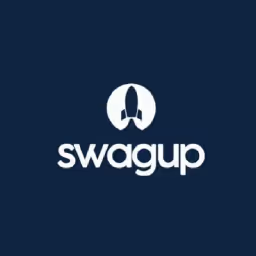Ebsta Alternatives
Considering Ebsta alternatives? This article offers a direct comparison of 10 other tools, analyzing their features, pricing, and use cases.

You might be using Ebsta for good reasons. The platform is known for its solid Salesforce and email integration. It helps track deals and automatically syncs activities, which is a plus for sales teams wanting clean data.
However, some users note its reporting can be basic and email syncs slow. These points might lead you to look for alternatives. We've analyzed top options based on G2 reviews to help you find the best fit for your team. Let's get started.
11x: Digital Workers for Sales Teams
For teams interested in digital workers for sales, 11x is a name to know.
The platform offers autonomous agents that can take on specific sales activities. See if its approach fits your operational goals.
11x is a GTM platform that uses AI agents to manage sales tasks. Its agent, Alice, finds prospects, handles outreach on email and LinkedIn, and maintains CRM data.
Another agent, Julian, qualifies inbound leads and books meetings. The platform unifies data enrichment, outreach, and email warmup, which can remove the need for separate tools in a GTM stack.
Ebsta Alternatives
Below, we review several Ebsta alternatives in detail. Each review covers pricing, core features, and how they compare to Ebsta in terms of benefits and potential drawbacks.
1) Gong
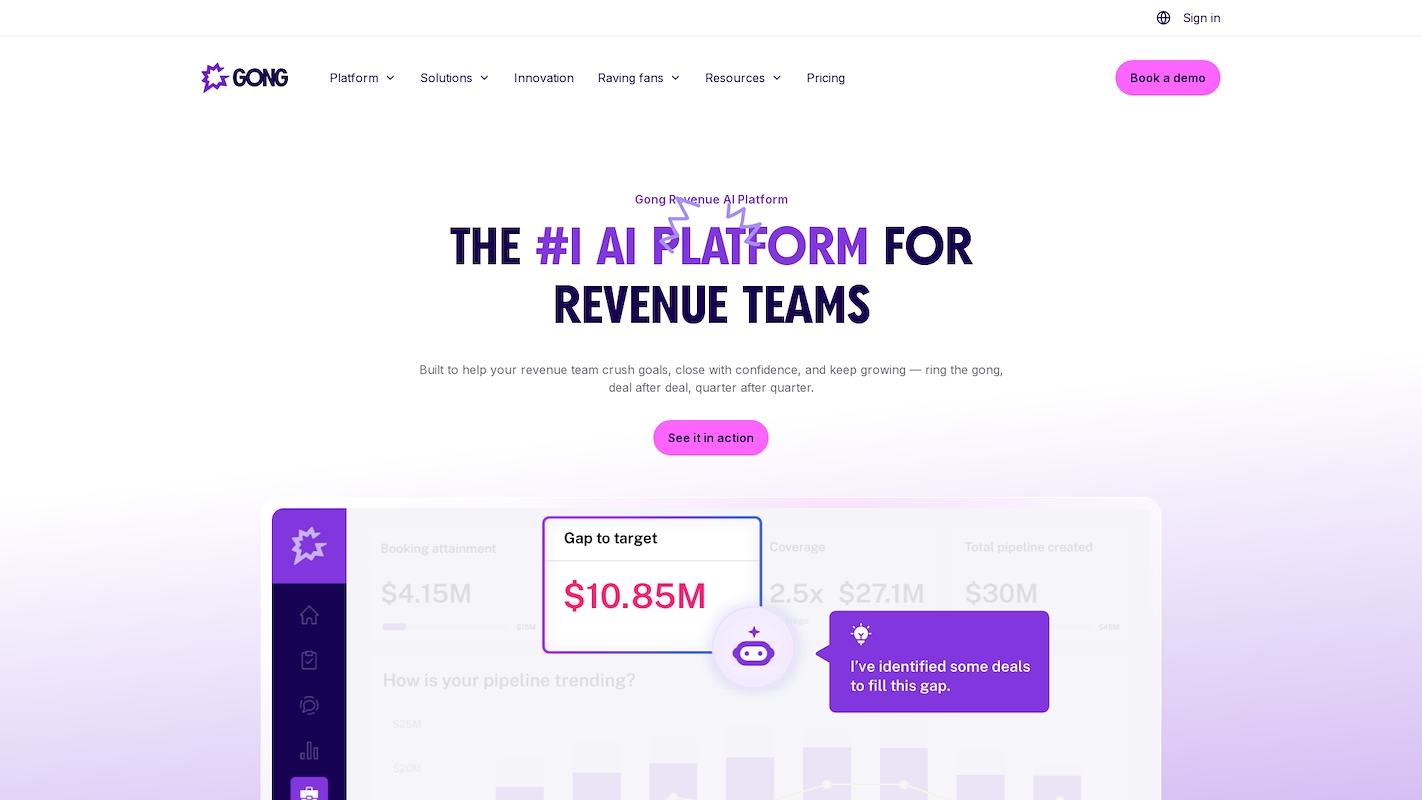
Gong is a revenue intelligence platform that centralizes customer interactions and CRM data. It uses AI agents to automate tasks and provide insights for deal execution, pipeline management, and forecast accuracy. It offers AI-guided sales engagement.
Use cases include support for rep ramp-up and market insights for strategic initiatives. Gong is designed for roles from individual sellers to CROs.
Gong's Main Features
- Captures, analyzes, and operationalizes customer interactions and CRM data in a unified workspace.
- Automates tasks and surfaces next-best actions using more than 12 domain-specific AI agents.
- Delivers data-driven forecasting with centralized analytics and bias-free insights.
- Provides AI-guided sales engagement to help prioritize and personalize outreach.
Gong vs. Ebsta: Where It Differs
Average Review Score: 4.8/5 stars based on 6,247 G2 reviews.
- Gong analyzes customer calls and emails with AI for deep interaction insights. This is more comprehensive than Ebsta's focus on activity synchronization.
- The platform includes specific sales coaching tools like scorecards. These tools help managers train reps on real conversations, a feature not central to Ebsta.
- Its forecasting uses AI to analyze pipeline data for accurate predictions. This capability is more advanced than the basic reporting some users note in Ebsta.
- This tool uses multiple AI agents to automate tasks and suggest next steps. This proactive guidance differs from Ebsta's primary function of automatic data sync.
Where Gong May Fall Short Compared to Ebsta
- Gong focuses on analyzing customer interactions for insights. For teams that only need direct activity synchronization into a CRM, Ebsta's dedicated feature set might be a more direct solution.
- The platform is a comprehensive revenue intelligence tool. This can mean a higher cost and greater complexity compared to Ebsta, which is built for a more specific purpose.
- Some users report occasional issues with call recording or data capture. This might be a factor for teams that need perfect reliability for their primary interaction data.
Cost and Value Comparison
Ebsta provides clear pricing from $50 to $70 per user, offering predictable costs. Gong does not publish its pricing, opting for custom quotes that reflect its broader, enterprise-focused platform. For specific pricing, you should visit Gong's official website.
2) Outreach
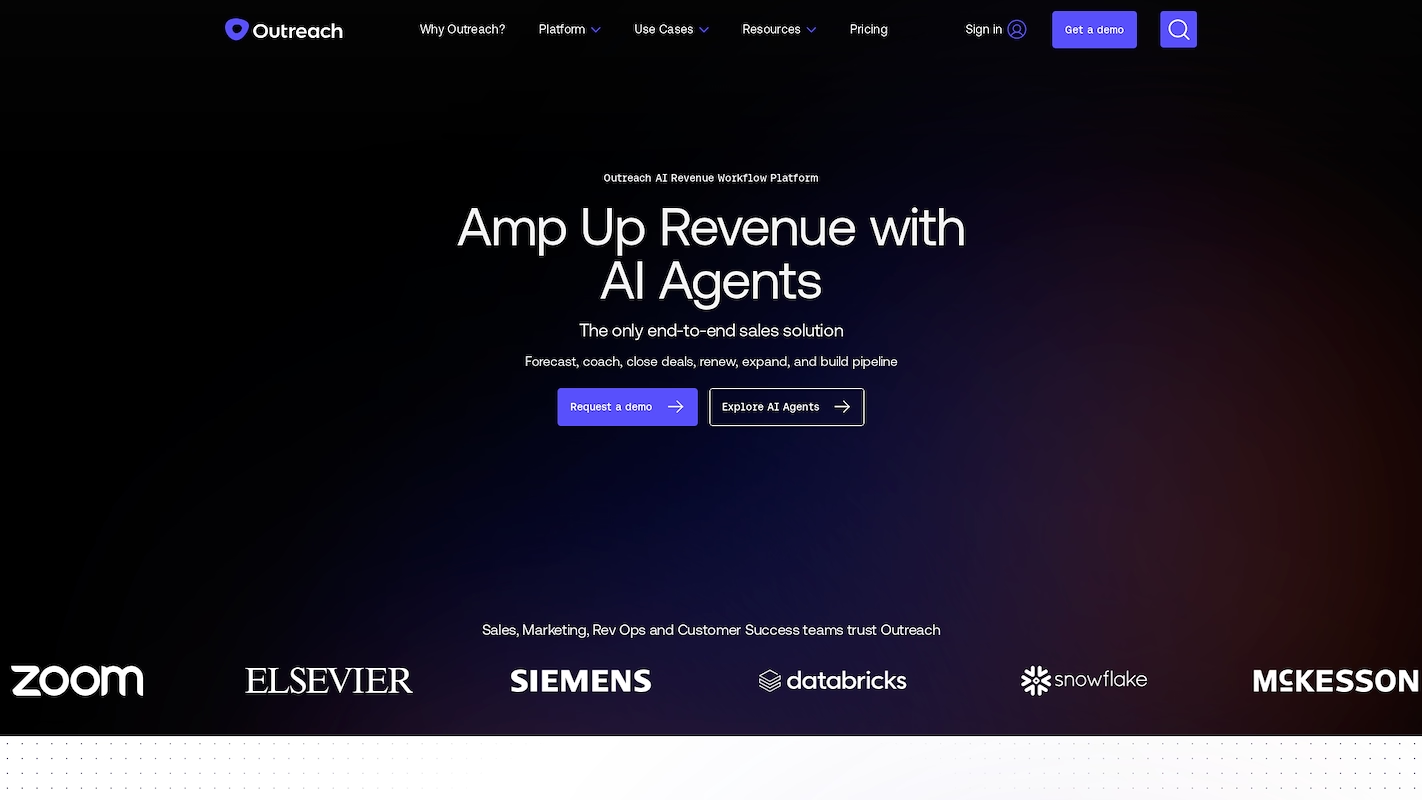
Outreach is an AI-powered Revenue Workflow Platform for sales execution. It uses AI agents, data workflows, and forecast models to help organizations build pipeline, close deals, and coach teams. The platform also includes controls for data security, privacy, and governance.
Outreach's Main Features
- Uses AI agents for tasks at each stage of the revenue cycle, from prospecting to retention.
- Provides AI-driven coaching for reps through meeting summaries, analytics, and deep-linked call moments.
- Analyzes buyer sentiment by detecting topics and tones across meetings, calls, and emails.
- Offers real-time content guidance during live calls with meeting prompts and content cards via its agent, Kaia.
Outreach vs. Ebsta: A Direct Comparison
Average Review Score: 4.3/5 stars based on 3,479 G2 reviews.
- Outreach offers sales engagement tools with automated sequences. This differs from Ebsta, which primarily focuses on activity synchronization with a CRM.
- It uses AI for sales coaching through call and meeting analysis. This feature offers more detailed training insights than Ebsta's data synchronization.
- The tool provides AI-driven forecasting for revenue prediction. This analytical capability is more advanced compared to the reporting features available in Ebsta.
- This platform gives reps real-time content guidance during live calls. This contrasts with Ebsta's function, which is to sync data after an interaction.
Where Outreach May Fall Short Compared to Ebsta
- Outreach provides a full suite of sales tools. This can be more complex and costly for teams that just need the dedicated activity synchronization Ebsta offers for Salesforce.
- Some users note occasional sync or integration problems with the platform. For teams that depend on flawless data synchronization, Ebsta's specialized function might offer more reliability.
- The tool's integration may not be as deep with certain CRMs. In contrast, Ebsta builds its value around a very tight integration with Salesforce, which can be an advantage for dedicated users.
Cost and Value Comparison
Ebsta offers transparent pricing from $50 to $70 per user, providing predictable costs. Outreach does not publish its pricing and instead provides custom quotes. For the most accurate pricing, visit Outreach's official website.
3) Salesloft
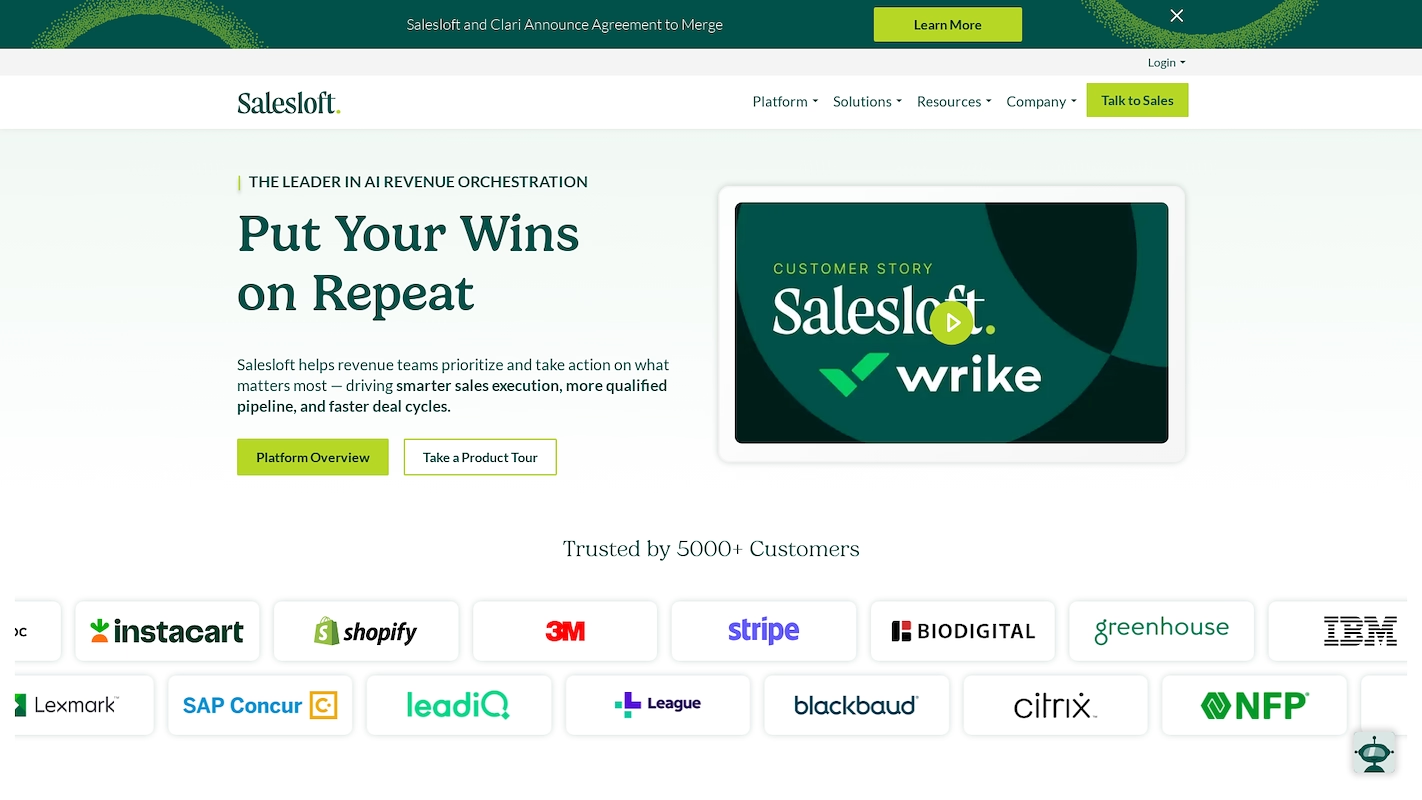
Salesloft is a Revenue Orchestration Platform. It aligns sales engagement, AI insights, conversation intelligence, deal management, and forecasting in one workflow. The platform uses AI agents to find buyer signals, suggest next actions, and automate tasks for revenue teams.
Use cases include pipeline creation, opportunity acceleration, and data-driven forecasting. The system helps optimize technology and improve team productivity for better deal velocity.
Salesloft's Main Features
- Uses automated, structured workflows called Cadence to build pipeline, nurture leads, and manage renewals.
- Employs an AI prioritization engine, Rhythm, to recommend the right actions for reps at the right moments.
- Provides deal and pipeline management with AI insights into risk, next steps, and sales velocity.
- Offers outcome-first AI agents through Conductor AI to automate, optimize, and scale sales processes.
Salesloft vs. Ebsta: A Direct Comparison
Average Review Score: 4.5/5 stars based on 4,145 G2 reviews.
- Salesloft uses structured workflows called Cadence to guide sales activities. This provides more process automation than Ebsta's focus on data synchronization.
- Its AI engine, Rhythm, suggests the next best actions for reps. This offers proactive guidance, which differs from Ebsta's reactive data capture.
- The platform provides conversation intelligence to analyze calls and meetings for insights. This is a deeper level of analysis compared to Ebsta's activity tracking.
- This tool includes AI-driven deal management and forecasting. These features offer more advanced analytics than the reporting capabilities found in Ebsta.
Where Salesloft May Fall Short Compared to Ebsta
- Salesloft is a comprehensive platform, so its integration may feel less specialized for teams that only need the deep, native Salesforce sync Ebsta provides.
- The tool's wide feature set can introduce a level of complexity. This might be a drawback for organizations looking for a simple, dedicated activity capture solution like Ebsta.
- Some users note occasional technical issues with email or call functions. For teams where perfect data sync is the top priority, Ebsta's focused purpose might be more suitable.
Cost and Value Comparison
Ebsta offers transparent pricing from $50 to $70 per user, providing predictable costs. Salesloft does not publish its pricing, opting for a custom quote model instead. For the most accurate pricing information, visit Salesloft 's official website.
4) Clari

Clari is a Revenue Platform that uses AI and automation to help teams stop revenue leak and improve revenue precision. It connects all revenue-critical employees and their activities to provide a single source of truth for the entire revenue process.
Use cases include forecast accuracy, pipeline health management, and deal velocity. The platform gives visibility to the whole revenue team, from reps to the C-suite.
Clari's Main Features
- Provides AI-driven forecasting and pipeline management using its core AI engine, RevAI.
- Automates sales engagement and prospecting through its Groove feature.
- Facilitates buyer collaboration with shared mutual action plans.
- Offers conversation intelligence and coaching capabilities through its Copilot feature.
Clari vs. Ebsta: Where It Differs
Average Review Score: 4.6/5 stars based on 5,464 G2 reviews.
- Clari provides AI-driven forecasting and predictive analytics for revenue. This offers more advanced insight compared to the basic reporting features in Ebsta.
- The platform offers live pipeline management with opportunity scoring. This is a more proactive approach to deal health than Ebsta's activity synchronization.
- It includes conversation intelligence and sales coaching tools. These features help train reps, a function not central to Ebsta's data sync purpose.
- This tool automates sales engagement and prospecting through its Groove feature. This expands beyond Ebsta's primary focus on syncing data into a CRM after interactions occur.
Where Clari May Fall Short Compared to Ebsta
- Clari is a comprehensive revenue platform. For teams that only need dedicated activity synchronization with Salesforce, Ebsta's focused toolset offers a more direct solution without added complexity.
- The platform's main purpose is revenue intelligence, not just data sync. Some users may find Ebsta provides a tighter, more specialized integration for capturing and logging activities within Salesforce.
- Its wide range of features can mean a higher cost and a more complex setup. In comparison, Ebsta has clear, per-user pricing and is simpler to implement for its specific task.
Cost and Value Comparison
Ebsta offers transparent pricing from $50 to $70 per user, providing predictable costs. Clari does not publish its pricing, opting for a custom quote model instead. For the most accurate pricing, visit Clari's official website.
5) Groove
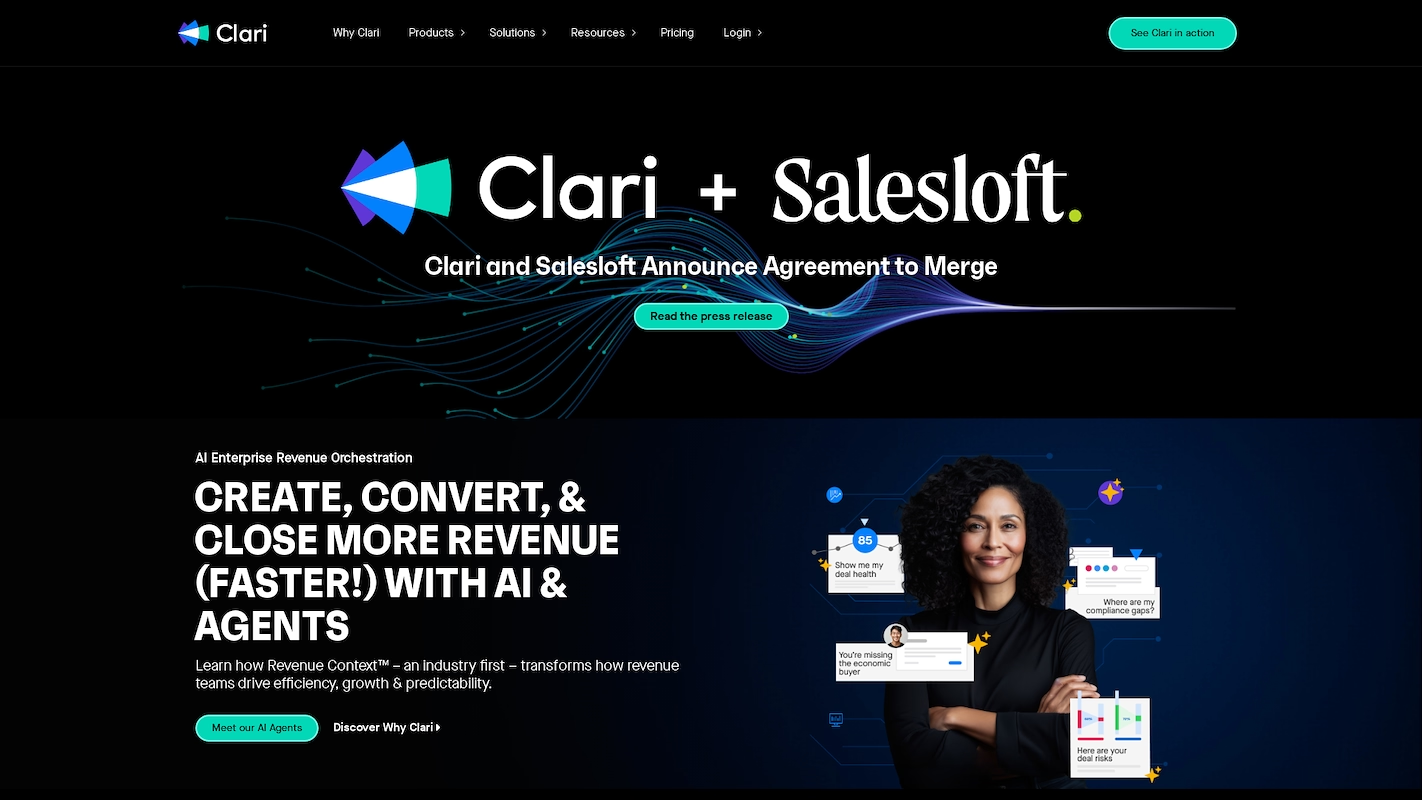
Groove, a Clari company, is a sales engagement platform. It supports revenue teams with pipeline creation and revenue growth through task automation. The platform gives sellers tools for customer contact across multiple channels. It integrates with Salesforce for automatic activity logs, so data stays current.
Use cases include outbound outreach, account-based engagement, and online meeting management. The system helps with meeting schedules and multi-channel campaign execution.
Groove's Main Features
- Automates tasks to support pipeline creation and revenue growth.
- Provides tools for multi-channel customer contact and campaign execution.
- Manages outbound outreach, account-based engagement, and online meeting schedules.
Groove vs. Ebsta: A Direct Comparison
Average Review Score: 4.6/5 stars based on 193 G2 reviews.
- Groove provides workflow automation to manage customer interactions. This offers more structured process control compared to Ebsta's focus on automatic activity logging.
- It includes a shared inbox for team collaboration on customer emails. This is different from Ebsta, which primarily syncs individual activities to a CRM.
- The tool offers communication templates to standardize responses. This productivity feature helps maintain consistency, an area not covered by Ebsta's data synchronization function.
- This platform centralizes communication from different channels. This gives a broader view of interactions than Ebsta's email and calendar integration.
Where Groove May Fall Short Compared to Ebsta
- Groove functions primarily as a help desk platform for customer support. Its main tools handle tickets and customer cases, a different purpose from Ebsta's focus on sales activity synchronization.
- It does not offer sales-centric features like relationship intelligence or detailed pipeline analysis. The platform's analytics focus on support metrics, in contrast to Ebsta's tools for deal progression.
- Some users report limitations in advanced email functions. For teams that rely on specific email capabilities, Ebsta's dedicated email integration may provide a more suitable toolset.
Cost and Value Comparison
Groove offers tiered plans from $15 to $40 per user per month, making it a more accessible option for teams with smaller budgets. In contrast, Ebsta's plans range from $50 to $70 per user, reflecting its specialized feature set for revenue intelligence.
Consider 11x for Digital Sales Workers
For teams that want to use digital workers, 11x provides a dedicated platform. Its AI agents handle prospect discovery, outreach, and CRM updates. A demo is the best way to assess if this model fits your operational goals and to see its functions firsthand.
With 11x, our AI runs the sales playbook. Alice finds accounts, enriches data, and starts outreach. Julian handles calls, qualifies leads, and schedules meetings. We combine intent signals and email warmup in one platform, removing the need for extra tools.
Book a demo to see it in action.
6) Revenue Grid
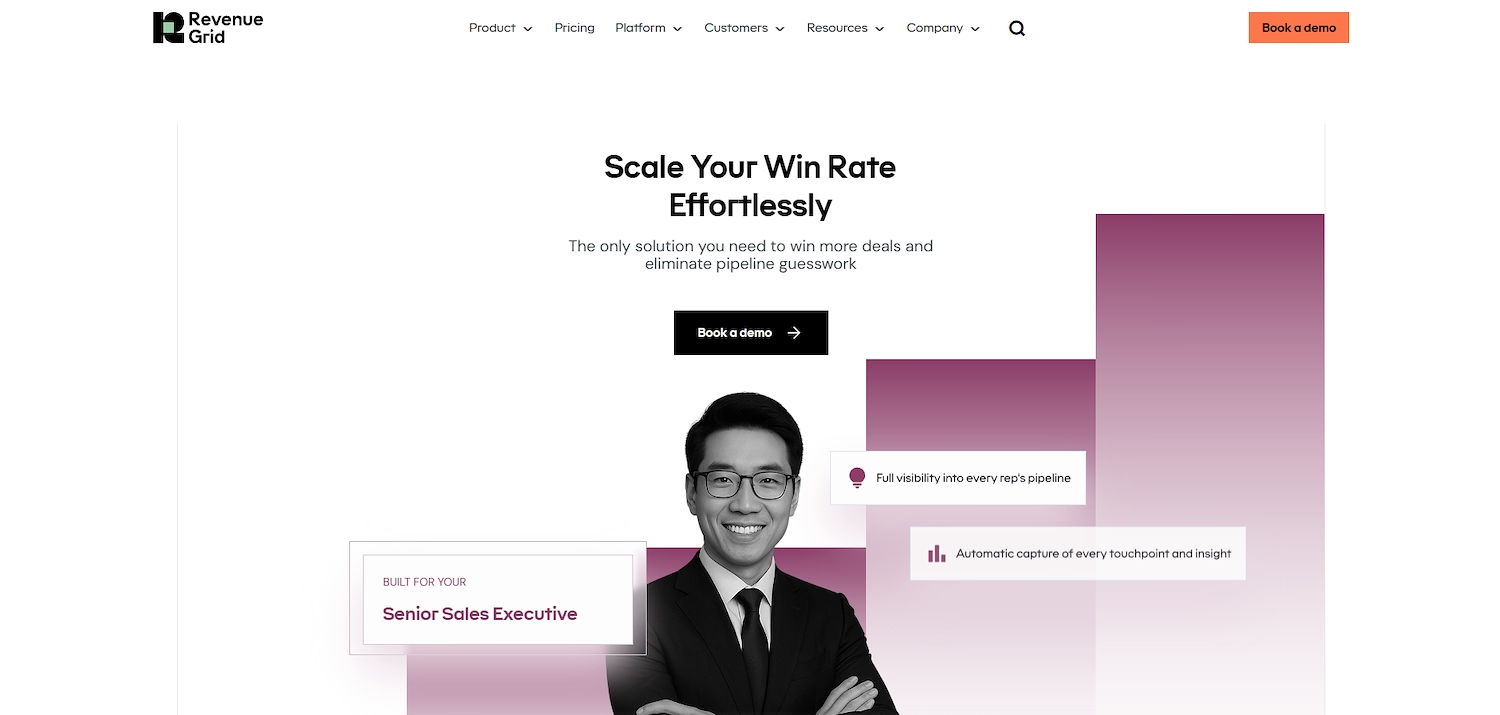
Revenue Grid is a platform that helps companies manage their revenue process. It provides tools to guide sales teams and capture data across interactions. Use cases include pipeline inspection and sales forecasting. The system offers a unified view of deal health and team performance for revenue operations.
Revenue Grid's Main Features
- Provides pipeline visibility and sales forecasting using AI-driven risk detection.
- Guides sales teams with multichannel sequences, deal guidance, and contextual alerts called Revenue Signals.
- Delivers in-CRM assistance with an AI assistant, Mentor, that gives next-step recommendations.
- Captures activity data automatically and offers intelligence for meetings.
Revenue Grid vs. Ebsta: Where It Differs
Average Review Score: 4.5/5 stars based on 512 G2 reviews.
- Revenue Grid provides AI-guided selling with "Revenue Signals" that suggest next actions. This offers proactive deal support, which differs from Ebsta's focus on reactive data capture.
- The platform offers advanced pipeline visibility with AI to detect at-risk deals. This is a more analytical approach compared to the activity tracking and basic reporting in Ebsta.
- It analyzes relationship intelligence to show time spent with key decision-makers. This provides deeper context than Ebsta, which logs interactions without this level of analysis.
- This tool includes conversation intelligence to analyze calls and meetings for insights. This function is different from Ebsta, which primarily records that an interaction occurred.
Where Revenue Grid May Fall Short of Ebsta
- Some users report that the Salesforce integration can have issues. In contrast, Ebsta is built specifically for a deep, native sync with Salesforce, which may offer more reliability for this core function.
- The tool provides a broad set of revenue intelligence features. This can add complexity for teams that only need the simple, dedicated activity capture that Ebsta offers.
- Its platform can have a more involved setup process. For teams that need a quick solution, Ebsta's focused design often allows for a faster implementation.
Cost and Value Comparison
Ebsta offers transparent pricing from $50 to $70 per user, providing predictable costs. Revenue Grid does not publish its pricing, opting for a custom quote model instead. For the most accurate pricing, visit Revenue Grid's official website.
7) Yesware
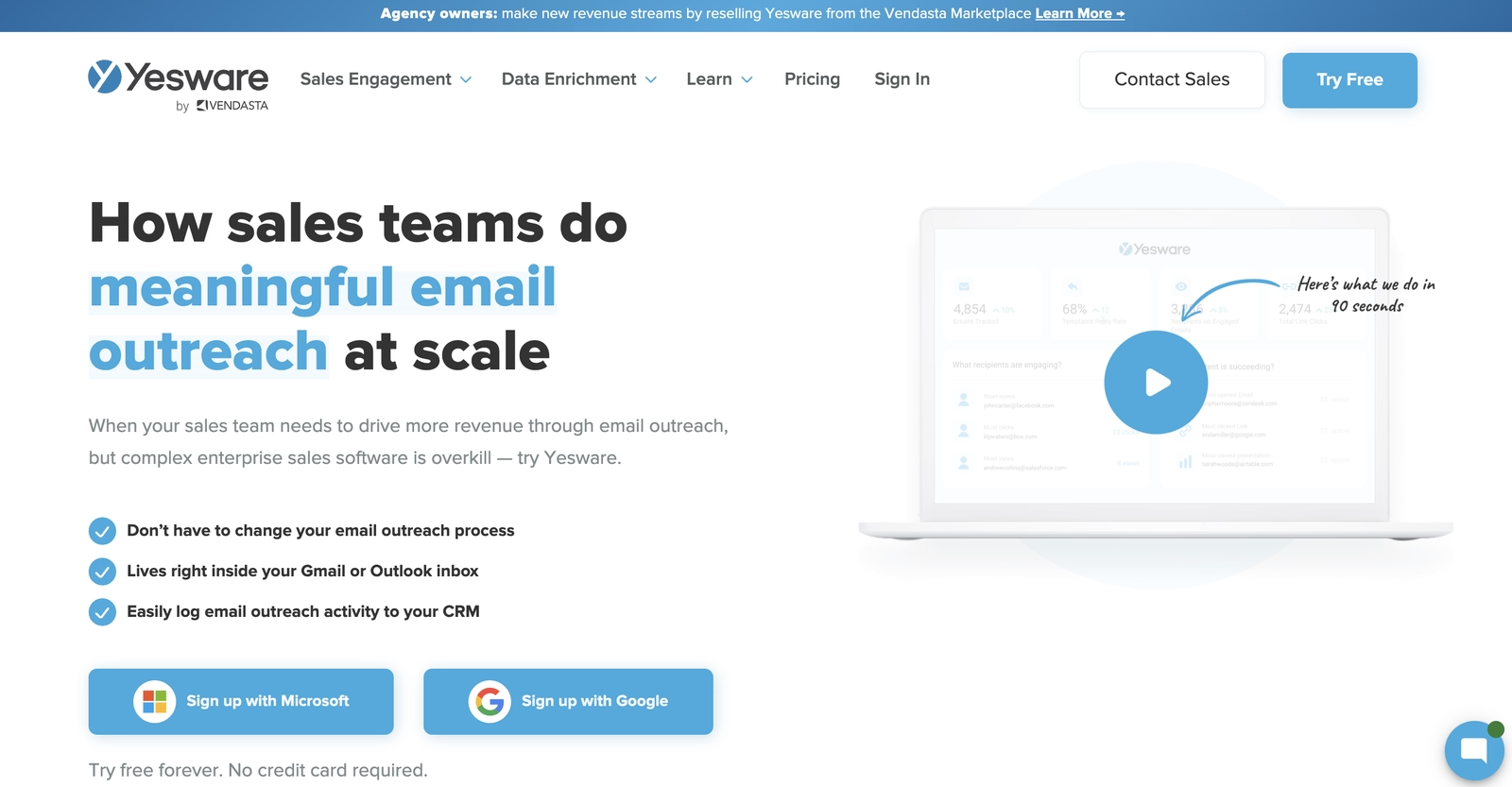
Yesware is a sales toolkit that integrates with your email. It gives sales teams tools for outreach and follow-up, such as email templates and automated sequences. The platform also tracks email opens and link clicks to provide engagement data.
Use cases cover sales prospecting and lead nurture efforts. It also provides analytics to measure performance and a tool to schedule meetings from the inbox.
Yesware's Main Features
- Automates multi-step, multi-channel outbound sequences.
- Tracks when recipients view attached files and sends real-time alerts.
- Books meetings directly from a user's email inbox with calendar integration.
- Provides access to a B2B contact database with over 100 million prospects.
Yesware vs. Ebsta: A Direct Comparison
Average Review Score: 4.4/5 stars based on 819 G2 reviews.
- Yesware provides detailed email engagement tracking, including open and link click alerts. This offers more granular insight than Ebsta's focus on just logging the activity.
- It allows users to create automated, multi-channel outreach sequences. This is a proactive sales engagement feature, while Ebsta primarily syncs data after an interaction.
- The tool offers email templates to standardize team communication. This is a productivity feature for outreach that is not a core part of Ebsta's data synchronization.
- Its meeting scheduler works directly from the user's inbox. This is a more direct approach to booking meetings compared to Ebsta's calendar activity sync.
- The platform includes a B2B contact database for prospecting. This feature expands beyond Ebsta's function, which centers on managing existing contact data.
Where Yesware May Fall Short Compared to Ebsta
- Yesware centers on email engagement metrics like opens and clicks. In comparison, Ebsta offers relationship intelligence to score the strength of connections within Salesforce, which is a different focus.
- The tool is built for active sales outreach with templates and sequences. This differs from Ebsta, which automatically syncs all activities in the background to maintain clean CRM data.
- Its analytics measure email campaign performance. This is less comprehensive than Ebsta's function, which helps track deal progression and overall pipeline health directly within the CRM.
Cost and Value Comparison
Yesware provides tiered plans from $15 to $65 per user, offering a more budget-friendly entry point for email outreach tools. Ebsta’s pricing, from $50 to $70 per user, is higher and aligns with its specialized revenue intelligence capabilities. Teams prioritizing cost-effective email engagement may find Yesware more suitable, while those needing deep CRM intelligence might justify Ebsta's price.
8) Mixmax
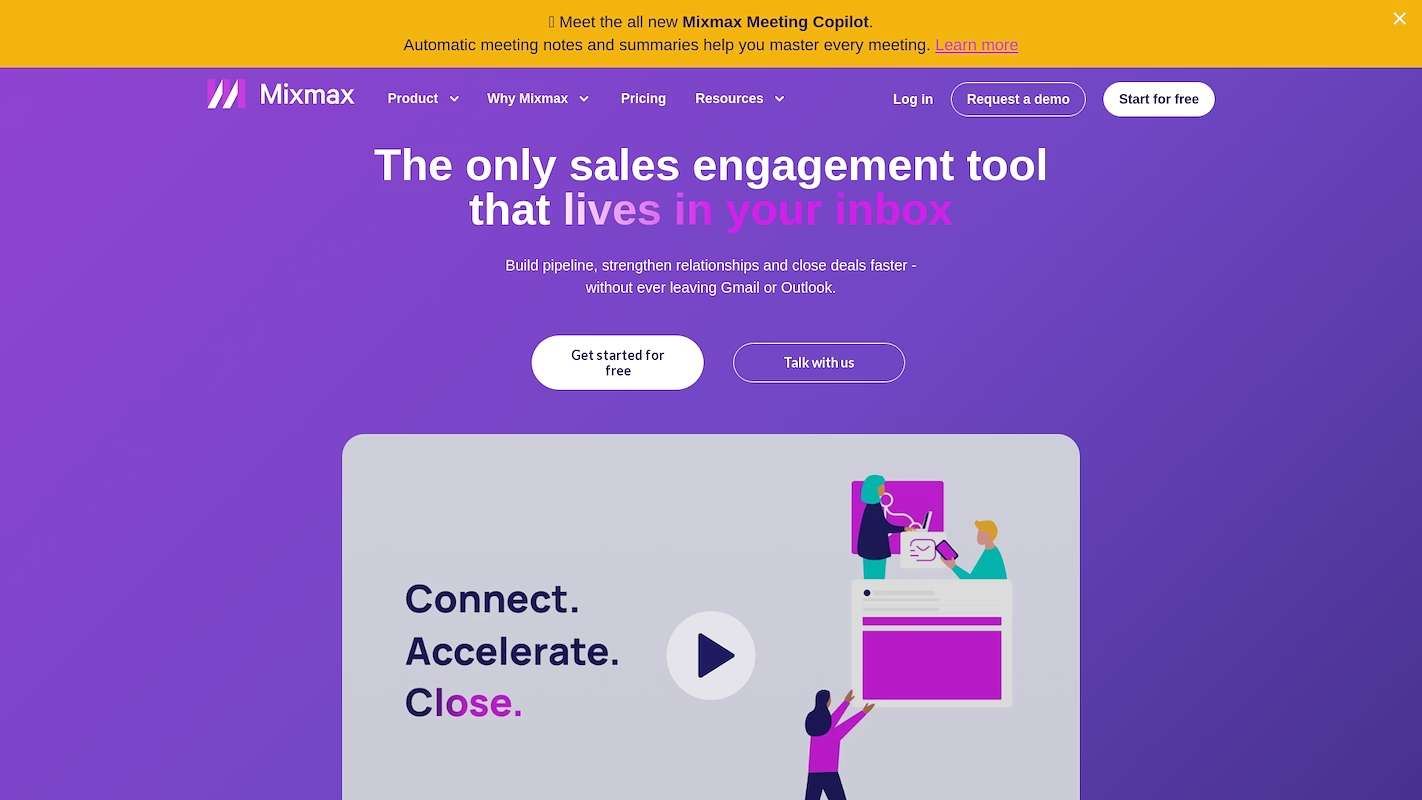
Mixmax is a sales engagement platform that integrates with Gmail and Salesforce. It offers tools to track emails, automate sequences, and schedule meetings. The system also supports interactive polls and surveys within emails to engage buyers.
Its use cases cover sales pipeline construction, customer success workflows, and recruitment outreach. The platform automates tasks and personalizes communication at scale.
Mixmax's Main Features
- Embeds interactive polls and surveys directly within emails to engage buyers.
- Tracks email engagement, including open rates, link activity, and attachment views.
- Schedules emails to send at optimal times and provides real-time notifications.
- Manages integrated workflows with task management and provides performance reports.
Mixmax vs. Ebsta: A Direct Comparison
Average Review Score: 4.6/5 stars based on 1,433 G2 reviews.
- Mixmax allows you to embed interactive polls and surveys directly in emails. This provides a way to engage buyers, which is different from Ebsta’s focus on just logging activities.
- It offers detailed email tracking with alerts for opens and link clicks. This gives more specific engagement insights compared to Ebsta, which primarily confirms that an interaction happened.
- The platform supports automated, multi-channel outreach sequences. This helps manage proactive sales campaigns, while Ebsta is designed for passive data synchronization.
- This tool includes a one-click meeting scheduler that works from the inbox. This is a more direct way to book meetings than Ebsta, which syncs calendar events after they are created.
Where Mixmax May Fall Short Compared to Ebsta
- Mixmax tracks email activity like opens and clicks. Ebsta goes a step further with relationship intelligence, which scores the quality of interactions inside Salesforce to provide a clearer picture of deal health.
- The platform's primary function is active sales engagement through outreach tools. This is different from Ebsta, which specializes in passive, automatic data synchronization to keep the CRM updated without manual effort.
- Its analytics center on email campaign results. This provides a more focused view compared to Ebsta, which offers broader insights into the entire sales pipeline and deal progression within the CRM.
Cost and Value Comparison
Mixmax provides plans from $49 to $69 per user per month when billed annually, which is comparable to Ebsta's range of $50 to $70 per user. With similar price points, the decision depends on specific needs. Teams focused on active outreach may prefer Mixmax, while those needing deep revenue intelligence might find Ebsta a better fit.
9) Aviso
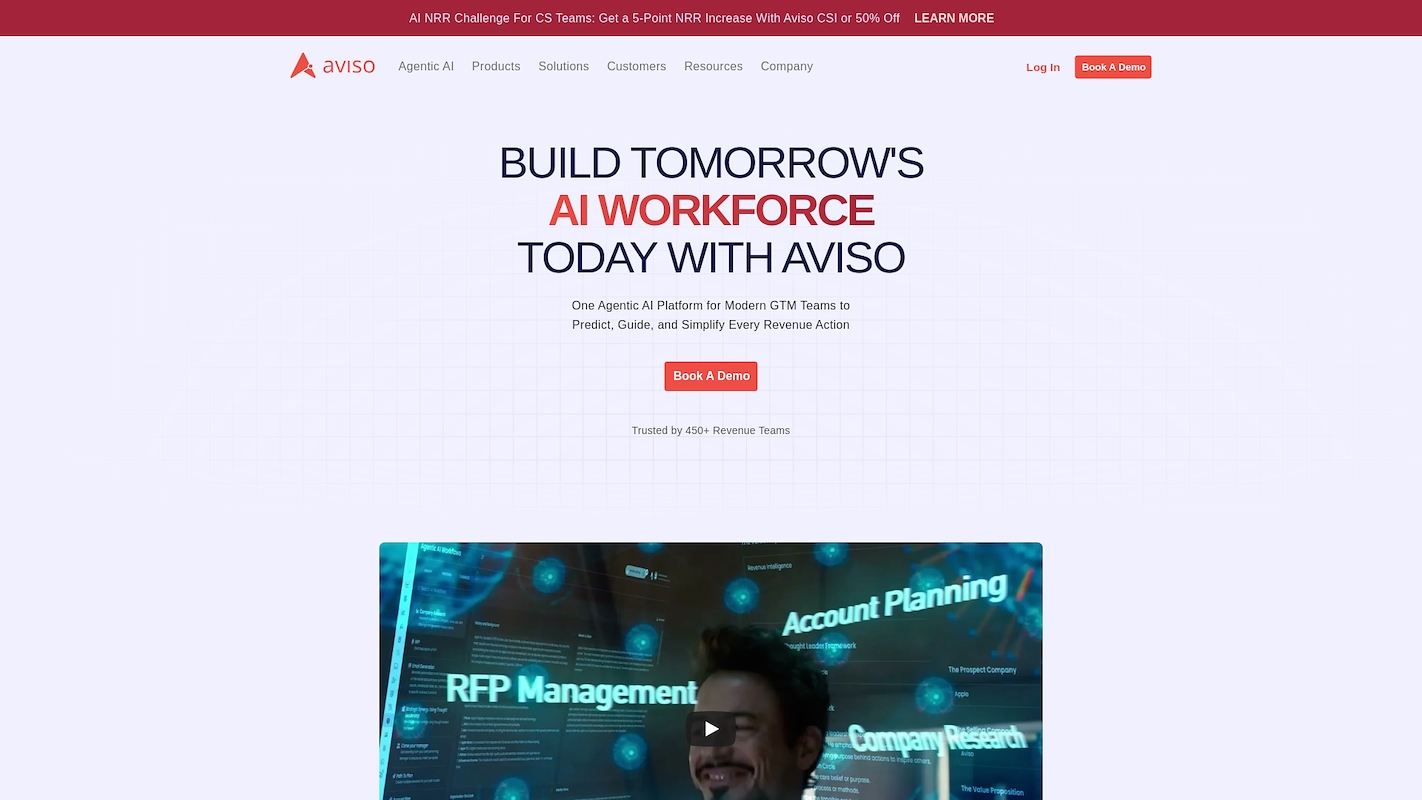
Aviso is a revenue platform that uses AI to connect teams and data across the revenue lifecycle. It provides a single source of truth for deal intelligence, forecast accuracy, and pipeline health. The system helps teams understand deal risks and opportunities to guide their actions.
Use cases cover sales team guidance, activity oversight, and strategic plans for revenue operations. It supports teams to improve overall performance.
Aviso's Main Features
- Provides AI-guided deal forecasting with predictive analytics and risk analysis.
- Offers live pipeline management with opportunity and lead scoring.
- Uses conversational, relationship, and lead intelligence to analyze interactions.
- Delivers coaching and enablement features, including sales gamification.
Aviso vs. Ebsta: Where It Differs
Average Review Score: 4.4/5 stars based on 834 G2 reviews.
- Aviso provides AI-guided forecasting to predict revenue and analyze deal risks. This offers more advanced analytics than Ebsta's basic reporting features.
- It offers live pipeline management with opportunity scoring to show deal health. This gives a more proactive view compared to Ebsta's activity logging.
- The platform uses conversational intelligence to analyze calls and meetings for insights. This is a different function from Ebsta, which focuses on logging that an interaction took place.
- This tool includes sales coaching and gamification features to help train reps. This is a capability not central to Ebsta's purpose of data synchronization.
Where Aviso May Fall Short Compared To Ebsta
- Aviso offers a wide range of revenue intelligence tools. This can be complex for teams that only need the simple, automatic activity capture Ebsta provides for Salesforce.
- Some users note its Salesforce integration can have issues. In contrast, Ebsta builds its platform around a deep, native sync with Salesforce, which may offer more reliability for that specific function.
- The tool's extensive features can create a steep learning curve for new users. Ebsta, with its more focused purpose, often presents a simpler user experience and a faster setup process.
Cost and Value Comparison
Ebsta offers transparent pricing from $50 to $70 per user, providing predictable costs. Aviso does not publish its pricing, opting for a custom quote model instead. For the most accurate pricing, visit Aviso's official website.
10) Apollo.io
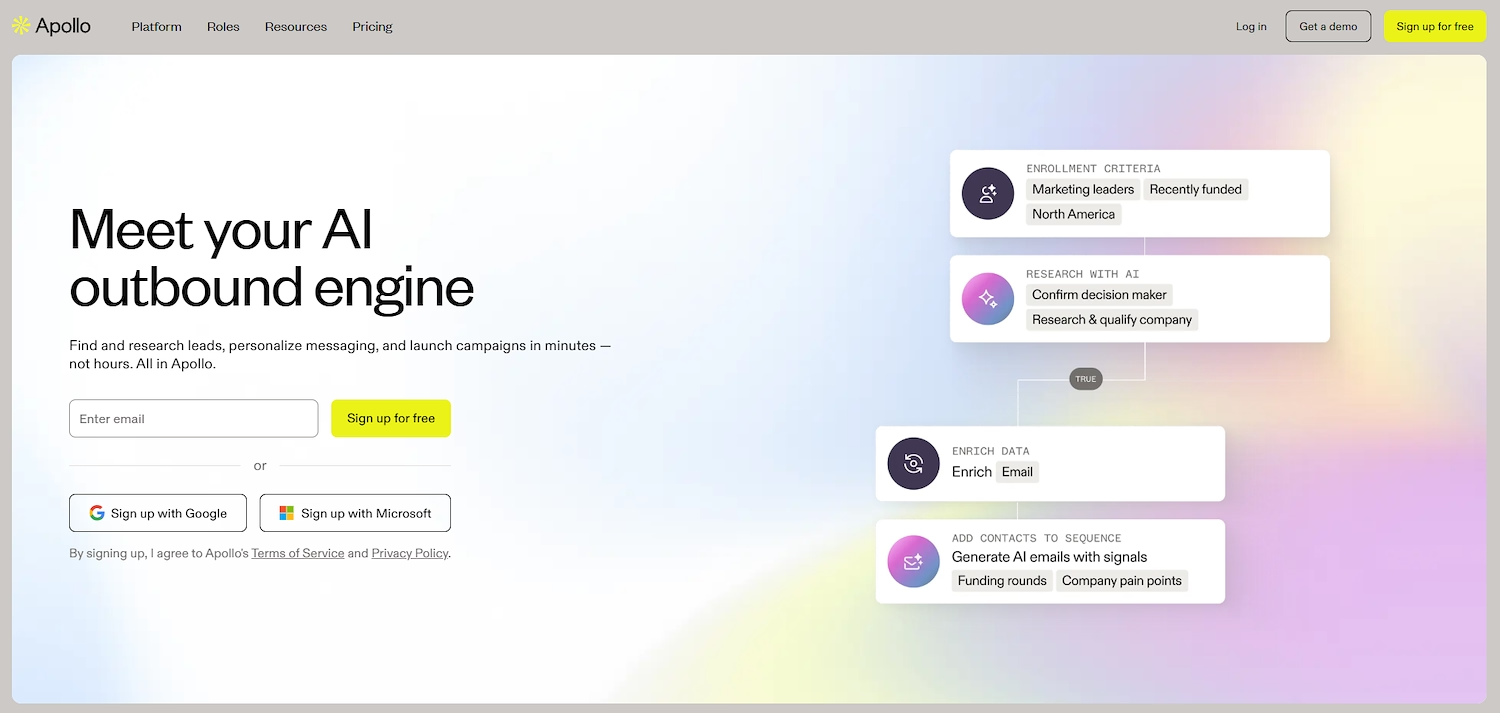
Apollo.io is a sales platform that provides B2B contact data and engagement tools. It combines a large prospect database with features for email sequences and analytics, which allows teams to manage outreach in one system.
Use cases include lead generation and the execution of outbound campaigns. The platform supports sales teams to find contacts, connect with buyers, and track performance.
Apollo.io's Main Features
- Provides access to a B2B database with over 210 million contacts and 35 million companies.
- Offers lead intelligence and search capabilities to identify and qualify prospects.
- Enriches and validates lead data to improve quality and accuracy for outreach.
Apollo.io vs. Ebsta: Where It Differs
Average Review Score: 4.7/5 stars based on 8,904 G2 reviews.
- Apollo.io includes a B2B database with over 210 million contacts for lead generation. This is a feature Ebsta does not offer, as it focuses on managing existing contact data within a CRM.
- The platform provides lead enrichment and validation to improve data accuracy. This differs from Ebsta, which primarily syncs existing data without this level of verification.
- It offers an engagement suite to automate outreach sequences for proactive prospecting. In comparison, Ebsta's main function is to passively sync activities after they happen.
- This tool combines prospecting, engagement, and data enrichment in one system. This integrated approach can reduce the need for multiple tools, while Ebsta specializes in CRM data synchronization.
Where Apollo.io May Fall Short Compared to Ebsta
- Apollo.io focuses on lead generation. It does not provide the deep relationship intelligence that Ebsta offers, which scores the strength of connections within Salesforce to show deal health.
- The tool is built for active sales engagement. This is different from Ebsta, which specializes in passive, automatic data synchronization that keeps the CRM updated without manual effort from reps.
- Its analytics center on the performance of outreach campaigns. This provides a different kind of insight compared to Ebsta, which offers a broader view of the entire sales pipeline and deal progression inside the CRM.
Cost and Value Comparison
Apollo.io offers a free plan and paid tiers starting at $49 per user, providing a more accessible entry point than Ebsta, whose plans range from $50 to $70 per user. This makes Apollo.io a cost-effective option for teams focused on lead generation. Ebsta's pricing aligns with its specialized function as a revenue intelligence platform for deep CRM integration.
Which One Should You Go With?
Many factors influence the choice of an Ebsta alternative. This guide reviewed several options to help you make an informed decision for your team.
If your team wants to use digital workers for sales, 11x offers a different approach. Its AI agents can handle tasks like prospect discovery, outreach, and CRM updates, which may reduce the need for multiple GTM tools and manual work.


